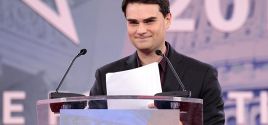Did You Know That Professional Writing Is Dying And Only Taxing The Public To Pay Writers Can Save Itby Tim CushingTechdirt Aug. 03, 2012 |
Popular 
Schumer Moves to Silence Criticism of Israel as Hate Speech With 'Antisemitism Awareness Act'

Federal Judge Orders Hearing Into Questionable 'Auction' of Infowars to The Onion

Trump Taps RFK Jr to Lead Health and Human Services

'More Winning!' Ben Shapiro Celebrates Trump Assembling an Israel First Cabinet

Infowars Auctioned Off to The Onion, Website Shut Down After 25 Years
 Another day, another article written on behalf of the disrupted, bemoaning the way things are, romanticizing the way things were and recoiling in horror from the touch of the "masses." This one's a particular treat, though, seeing as it's written by Ewan Morrison, the author whose ACTA "expertise" resulted in the "Most Clueless Column Ever." This article's headline is just as shocking: "There will be no more professional writers in the future." Morrison, sees the direness of his particular situation and has boldly taken it upon himself to speak for the entirety of professional writers, rather than just writers in his particular situation. This is never a good idea. By his own account, Morrison is also being driven out of business by the ominously feudal economics of 21st-century literature, "pushed into the position where I have to join the digital masses," he says, the cash advances he once received from publishers slashed so deep he is virtually working for free.Morrison fails to specify how many dollars separate "virtually" from "actually," but one is left to imagine that the number is distressingly low. If you're looking to sell books, there are many ways to sell books. If you're looking for one particular way to sell books and that's no longer breaking even, then the problem isn't the rest of the world. The problem is the method that no longer works. And this phrase: "...where I have to join the digital masses." Heaven forfend! How awful. Just the sheer thought of having to mix with general population... [Pause briefly to prevent eyes from rolling completely out of their sockets.] Get over yourself. Now, in articles bemoaning the current state of art, media, content, whatever, it's only a matter of time before the ebook-bashing starts. In this case, we only have to wait until the fourth paragraph. And not only them: From the heights of the literary pantheon to the lowest trenches of hackery, where contributors to digital "content farms" are paid as little as 10 cents for every 1,000 times readers click on their submissions, writers of every stature are experiencing the same pressure. Authors are losing income as sales shift to heavily discounted, royalty-poor and easily pirated ebooks. Journalists are suffering pay cuts and job losses as advertising revenue withers. Floods of amateurs willing to work for nothing are chasing freelance writers out of the trade. And all are scrambling to salvage their livelihoods as the revolutionary doctrine of "free culture" obliterates old definitions of copyright.Ebooks: "heavily discounted, royalty-poor and easily pirated." Weird. That doesn't sound like ebooks to me. The ebooks I'm familiar with have better royalty rates at lower price points and any "discounting" is done by the author, usually to increase sales (and royalties) rather than as some sort fiscally self-destructive "cry for help". "Easily pirated?" Name another form of digital media that isn't. If you know you're going to be competing with free, it kind of makes sense to not charge trade paperback prices for something that fits on a micro-SD card with room to spare. The economic trajectory of writing today is "a classic race to the bottom," according to Morrison, who has become a leading voice of the growing counter-revolution – writers fighting fiercely to preserve the traditional ways. "It looks like a lot of fun for the consumer. You get all this stuff for very, very cheap," he says. But the result will be the destruction of vital institutions that have supported "the highest achievements in culture in the past 60 years."Well, let me know how that fight turns out, Morrison. "Preserving traditional ways" certainly sounds like just the sort of technobabble needed to turn a generation raised on free social media, free cloud services, free news, free-to-play online games and free music into paying customers. If I were a betting man, I'd be putting my money on the "destruction of vital institutions." Of course, this "destruction" seems a lot less harrowing when you get a more objective definition of the word "vital." Many will cheer, Morrison admits, including the more than one million new authors who have outflanked traditional gatekeepers by “publishing” their work in Amazon’s online Kindle store. “All these people I’m sure are very happy to hear they’re demolishing the publishing business by creating a multiplicity of cheap choices for the reader,” Morrison says. “I beg to differ.”Of course you beg to differ, Morrison. This is competition. This is no longer a one-way funnel from publishers to book stores with gatekeepers on either end. This is a tsunami of change, covering how media is consumed, distributed and created. I wouldn't expect you to be thrilled, but I'd at least expect you to realize that you can't drag the past into the future. It's impossible. You can make angry statements and point fingers and fiercely guard what's left of your chosen field, or you can direct some of that energy towards moving forward and making the most of the new tools and services available. But Morrison's not interested in that. In a companion piece for the Guardian, Morrison paints an even bleaker picture. Citing the explosive growth of ebooks and the long tail phenomenon, he reaches the conclusion that the death of the professional author is a foregone conclusion. All that's left is to wait for the body to cool. Between piracy and ultra-low prices, there's no hope for the creative world (writers, musicians, filmmakers, photographers, etc.). He gives it about a "generation" before being an artist of any type will be unsustainable. But... he has a solution (or rather, the "only" solution): The only solution ultimately is a political one. As we grow increasingly disillusioned with quick-fix consumerism, we may want to consider an option which exists in many non-digital industries: quite simply, demanding that writers get paid a living wage for their work. Do we respect the art and craft of writing enough to make such demands? If we do not, we will have returned to the garret, only this time, the writer will not be alone in his or her cold little room, and will be writing to and for a computer screen, trying to get hits on their site that will draw the attention of the new culture lords – the service providers and the advertisers.Really? This is a "solution?" He offers no further details, leaving this "political" solution open to interpretation. Does Morrison mean that artists should be supported by some sort of monthly stipend? Just fill out a form listing your occupation as "writer" or whatever and mail it in to the Department of Social Services or other relevant governing body and wait for your "artfare" check to show up once a month? Or is he suggesting some sort of bailout for publishing houses, record labels and any other part of the creative industry that's currently struggling? If so, good luck. Here in America, at least, most of the general public was against bailing out domestic manufacturers of automobiles, a physical product that's much more useful than a song, a book or a photograph. It's not impossible to get this sort of thing done if you're connected to the right politicians, but it's not going to make a large portion of your potential audience very happy. A bailout situation also lends itself to recurring transfusions of public money because, in most cases, it's just a stay of execution. The public didn't care whether or not GM had the opportunity to crank out another vehicle because they had plenty of other options. Don't delude yourself into thinking the same doesn't apply here. All those "millions" willing to do your job on the cheap will plug any holes you leave behind, Ewan. It's one thing to thing to try and push anti-piracy legislation through and hope that this will somehow increase sales. It's quite another to require the public to make up the difference via taxation. We already have enough discussions about using tax dollars (via the NEA) to fund art that some find offensive. Imagine doing this on a massive scale like the one Morrison suggests. Discussions would go far beyond shoving crufixes into jars of urine and cover just about every iteration in the creative industry. If you think that public money will flow uncontested, then you obviously don't know a thing about politicians. The minute the wind starts blowing unfavorably, you'll all be stuck writing safe, boring beach novels or risk having your funding yanked. Whatever Morrison's actual plan is, it's still going to boil down to the same thing: artifically propping up the remnants of an industry at the public's expense. This may get applause when preaching to the converted, but the people you really need on your side -- the consumers? All they'll see is someone yelling about how the world owes them a living. |



